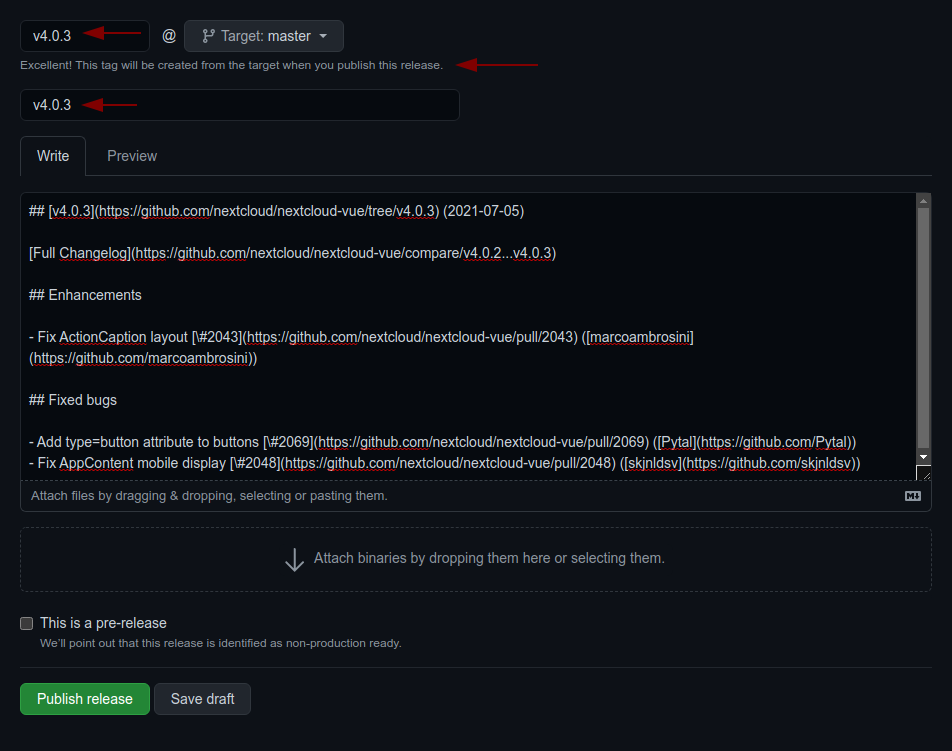|
|
||
|---|---|---|
| .github | ||
| build | ||
| cypress | ||
| docs | ||
| l10n | ||
| resources/timezones | ||
| src | ||
| styleguide | ||
| tests | ||
| .editorconfig | ||
| .eslintrc.js | ||
| .gitignore | ||
| .stylelintignore | ||
| CHANGELOG.md | ||
| LICENSE | ||
| Makefile | ||
| README.md | ||
| babel.config.js | ||
| cypress.json | ||
| package-lock.json | ||
| package.json | ||
| styleguide.config.js | ||
| stylelint.config.js | ||
| webpack.common.js | ||
| webpack.dev.js | ||
| webpack.prod.js | ||
README.md
Vue components
This repo contains the various Vue.js components that Nextcloud uses for its internal design and structure. It provides standardized UI elements for building Nextcloud app frontends with Vue.js.
Documentation
A list of available components with examples to try out is available in the documentation.
Getting started
App example
If you want to check a real live example of a nextcloud app that uses this library, you can head over to https://github.com/skjnldsv/vueexample/ We will try to maintain this repository the best we can, but some example might be obsolete. Always check this repository documentation.
Install the library
npm i --save @nextcloud/vue
Usage
To use a component, just import it:
import { AppNavigation } from '@nextcloud/vue'
Depending on which components you use, you might want to only import individual (separately bundled) components:
import Avatar from '@nextcloud/vue/dist/Components/Avatar'
Development setup
If you want to work on improving the components it’s best to run the latest code and link it to your local Nextcloud installation:
- Install the dependencies with
npm ci - Build the components every time you do changes:
npm run build - Connect it to your local Nextcloud development setup:
- In this repository do
npm link - In the repository of an app do
npm link @nextcloud/vue(you need to re-link any time you donpm ciin the app)
- In this repository do
- Then build the app with:
npm run build(or watch for changes withnpm run watch)
Styleguide
When developing new components or extending compnents, make sure to also have some bits of related documentation like examples, where applicable.
To test components and the documentation in that context, you can run npm run styleguide to run a local server that serves the style guide
with all the components.
Using vue-devtools in Firefox
If you want to use vue-devtools in Firefox, you need to patch your nextcloud instance as follow:
diff --git a/lib/public/AppFramework/Http/ContentSecurityPolicy.php b/lib/public/AppFramework/Http/ContentSecurityPolicy.php
index 3a9ab8f8c1..4bc2b4a4d0 100644
--- a/lib/public/AppFramework/Http/ContentSecurityPolicy.php
+++ b/lib/public/AppFramework/Http/ContentSecurityPolicy.php
@@ -42,9 +42,9 @@ namespace OCP\AppFramework\Http;
*/
class ContentSecurityPolicy extends EmptyContentSecurityPolicy {
/** @var bool Whether inline JS snippets are allowed */
- protected $inlineScriptAllowed = false;
+ protected $inlineScriptAllowed = true;
/** @var bool Whether eval in JS scripts is allowed */
- protected $evalScriptAllowed = false;
+ protected $evalScriptAllowed = true;
/** @var array Domains from which scripts can get loaded */
protected $allowedScriptDomains = [
'\'self\'',
Releasing a new version
- Pull the latest changes from
masterorstableX; - Checkout a new branch with the tag name (e.g
v4.0.1):git checkout -b v<version>; - Run
npm version patch --no-git-tag-version(npm version minor --no-git-tag-versionif minor). This will return a new version name, make sure it matches what you expect; - Commit, push and create PR;
- Add the change log content from the 'Changelog' action on Github to
CHANGELOG.md; - Commit and push;
- Get your PR reviewed and merged;
- Create a release on github with the version as tag (e.g
v4.0.1) and add the changelog content as description (https://github.com/nextcloud/nextcloud-vue/releases);


